Category:Uncategorized
2025 GCBR Home Show Expo
Mar 29 at 11:00AM - 3:00PM
Garrett County Fairground
270 Mosser Road
Ag Hall
McHenry
21541
Family-friendly, free & open to the public! Activities for kids. Food available, proceeds going to Cindy's Fund. Vendors include lenders, landscapers, home inspectors, interior designers & MORE!
The Expo will host an extensive range of businesses – from service providers to lending institutions to home improvement and construction companies – all within Garrett County and the surrounding area. The public will have a chance to meet with local businesses that may be of resource to them and their home needs. This will be an opportunity for businesses to connect and showcase what they have to offer YOU!
Additionally, The Travel Mug trailer will be setup to sell hot and cold beverages.
Cindy's Fund (a local charity on a mission to help cancer patients in Garrett County) will be running concessions from the kitchen with proceeds going to support their mission, and Emalee Dicks will be doing face painting for children for FREE.
Courtesy of Level Acres Landscaping & Nursery from Springs, PA, at least the first 50 children will get to become mini landscapers for a day! Kids will have the opportunity to experience a little piece of landscaping with some added fun, designing and decorating individual planters, and planting a plant to take home and watch grow.
Come to meet with our vendors or just to look around at the boats and hot tubs that will be on display!
Easter at the Airport
The Garrett County Airport is opening its doors for a fun-filled, family-friendly Easter celebration on Saturday, April 12, from 2:00 to 5:00 p.m. This free event, presented in partnership with Taylor-Made Deep Creek Sales, welcomes guests of all ages to enjoy an afternoon of activities, crafts, and sweet treats.
Families can take part in egg coloring with TEAM 1629 Robotics, create paper airplanes from coloring sheets, and snap pictures with the Easter Bunny. Kids will also receive free candy eggs while supplies last. Adding to the excitement, HART for Animals will be on-site with adoptable puppies looking for their forever homes.
The Garrett County Airport invites the community to come out, celebrate the season, and enjoy a unique Easter event in a one-of-a-kind setting.
For more information about the event, please contact Adison Wyer, Garrett County Airport Manager, at 301-746-8599 or awyer@garrettcountymd.gov.
Maryland Sets 51 Youth Fishing Rodeos for 2025
The Southern Maryland Chronicle
ANNAPOLIS, Md. — The Maryland Department of Natural Resources is ready to make waves in 2025, rolling out 51 youth fishing rodeos across the state for kids ages 3 to 15. From the first blooms of spring to the crisp days of late fall, these free events aim to hook young anglers—whether they’re casting their first line or sharpening seasoned skills—in a tradition that’s been reeling in Maryland families for over six decades. Spanning 16 counties, the rodeos promise a blend of excitement, education, and a chance to connect with nature, often set against the backdrop of Maryland’s sprawling State Parks.
This isn’t just about fishing—it’s about legacy. Some of these rodeos trace their roots back to the 1960s, sparked by a vision to give kids a safe space to learn the art of angling while planting seeds of environmental care. Last year, the program drew over 3,300 young participants, a splashy success that’s buoyed DNR’s plans for 2025.
A young angler with his catch during a 2024 youth fishing rodeo near Easton. Maryland DNR photo.
Partnering with dozens of local organizations—from community clubs to park rangers—they’re staging events at ponds, lakes, and streams statewide, backed by the U.S. Fish and Wildlife Service’s Wildlife and Sport Fish Restoration Program. That federal funding keeps the rodeos free, ensuring every kid gets a shot at the water.
Picture this: a sunny morning at Patapsco Valley State Park, a 5-year-old gripping a rod as a sunfish tugs the line, or a 14-year-old at Tuckahoe State Park perfecting a cast under a volunteer’s watchful eye. The rodeos teach more than technique—knots, baiting, patience—they instill a respect for the ecosystems that sustain Maryland’s waterways.
In 2022, DNR stocked over 6,000 hybrid sunfish and trout for these events, per agency records, tipping the odds toward a catch. No license needed for those under 16, though adults and teens can grab one online or at agents, with every dollar fueling conservation efforts like habitat restoration and fish stocking.
The schedule’s a county-by-county haul—Garrett’s mountain streams, Worcester’s coastal flats, and everywhere in between. But some venues cap attendance, so DNR’s nudging families to hit the website, register via listed contacts, and double-check for weather-driven shifts. Last fall’s downpours bumped a few 2024 dates, a heads-up to stay sharp. Events often come with perks—loaner rods, bait, even snacks at spots like Cunningham Falls—making it low-stakes fun with high rewards.
Maryland’s fishing heritage runs deep, from the Chesapeake Bay’s bounty to Deep Creek Lake’s quiet shores. With over 500 miles of fishable streams and countless ponds, per DNR’s maps, the state’s a natural stag
Garrett College spring headcount grows 8%
Number of spring credit students is highest since 2016
McHenry, MD – Garrett College recorded its highest total of spring semester credit students in nine years this semester, according to data released by the College’s Office of Records and Registration (ORR).
GC has 677 credit students this spring, an increase of eight percent, the highest since the College enrolled 693 students in spring 2016. This spring’s enrollment is the second-highest headcount in the last 12 years.
“We’re very pleased to see enrollment continuing to grow,” said Dr. Richard Midcap, Garrett College’s president. “With spring enrollment now finalized, we’ve seen credit enrollment growth for three consecutive fiscal years.”
Total spring credit hours taken by Garrett’s students increased 8.4 percent, rising from 5,650.50 in spring 2024 to 6,126.50 in spring 2025. That’s the highest total since spring 2020, when the College logged 6,190.75 spring credit hours.
The College’s headcount enrollment has grown 28.7 percent over the last four years, according to ORR data. GC’s spring credit hours increased 23 percent over the same four-year time period.
“Our student headcount is almost 12 percent higher than spring 2020, which was our last pre-COVID semester,” said Dr. Robert “JR” Kerns, GC’s dean of student affairs. “That’s really quite an achievement.”
Kerns said new academic programs, including sport management, and expansion of the College’s intercollegiate athletic program have both played roles in GC’s enrollment growth.
“We’ve been intentionally trying to expand opportunities that provide enrollment growth potential,” said Kerns, adding he expects the radiologic technology program that launches in June and the men’s soccer program that starts in August to further expand enrollment.
Ongoing increases in the number of High School Dual Enrollment (HSDE) students is helping to drive headcount increases, according to Dr. Kelli Sisler, GC’s director of institutional effectiveness.
“HSDE grew almost 15 percent from last spring to this spring,” said Sisler, noting that the Garrett College Scholarship Program continues to fund HSDE. “The five-year trend data is even more impressive – there has been an 85 percent increase in the number of HSDE participants this spring compared to spring 2020.”
Professor Christa Bowser, GC’s chief academic officer, said implementation of The Blueprint for Maryland’s Future by Garrett County Public Schools (GCPS) and Garrett College has played a key role in expanding HSDE.
“The Blueprint emphasizes public schools and colleges working collaboratively to offer high school students a dual enrollment option, which GCPS and the College have worked extensively to provide,” said Bowser. “GCPS and the College already had a close working relationship, but the Blueprint sparked an even higher level of collaboration.”
GC’s part-time student population hit an all-time high this spring with 369 part-time students, which Bowser said is largely due to the increase in HSDE.
Garrett County Chamber Of Commerce What's Happening In Garrett County
Garrett County Chamber of Commerce
March 19 - March 25, 2025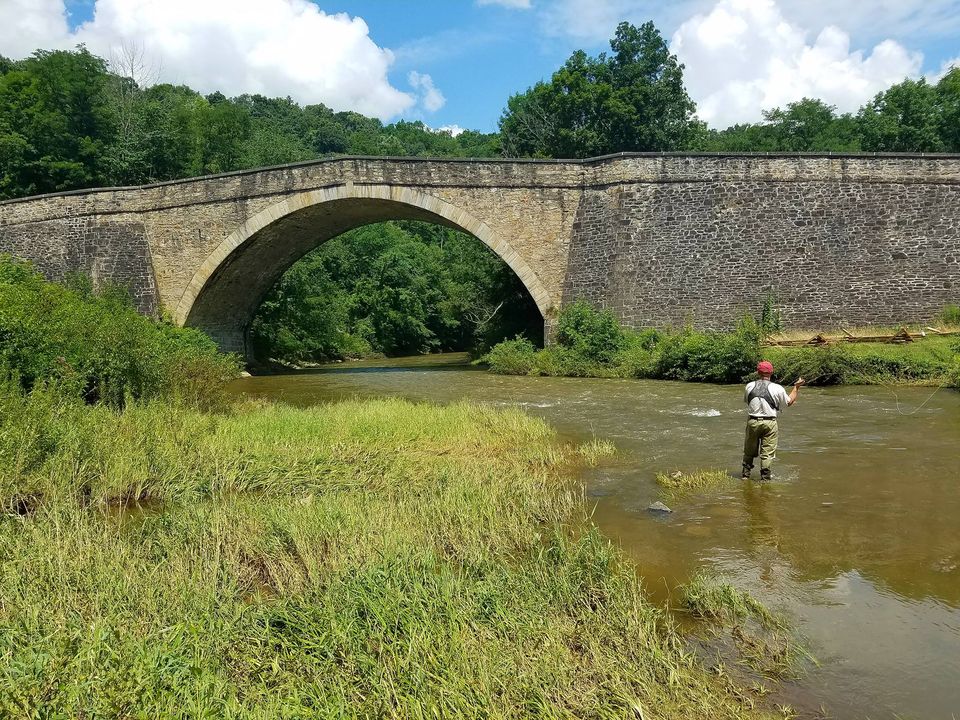 |
 |
 |
March 20 | 5:30 pm - 9:00 pm "Jameson for Your Jigs" Event at Shamrock Whiskey & Cigar Bar624 Humbert School Rd, Rockwood, PA.Enjoy food and drinks from Emerald Isle as Jameson hosts our Irish fest. Sampling & Cocktail Hour begins at 5:30 with Dinner at 6:45pm. Hosted by Shamrock Whiskey & Cigar Bar and Southern Glazers Wine & Spirits.5:30 - 6:30 Irish Whiskey tasting & Cocktail hourEnjoy samples from Jameson, Redbreast, & Green Spot or a Specialty Cocktail created to feature each Irish WhiskeyDinner at 6:45pmIncludes: Irish Pub Salad, Baked Oysters, Braised Beef Short Rib, Plum & Cream CobblerTickets are $75 each which includes dinner, tasting, tax & gratuity.Cash Bar available for anything additional.There will be prizes & giveaways from our Irish Whiskey Sponsors!!Click here for tickets: https://square.link/u/qGmSEO1p |
 |
March 20 | 6:00 pm - 7:00 pm Deep Creek Lake Lecture Series Performing Arts Center at Garrett College, McHenry, MD.Join us for our Deep Creek Lake Lecture Series every Thursday in March 2025, 6pm at the Performing Arts Center at Garrett College. The lecture topics are:-Operation of the Deep Creek Hydroelectric Power Station (Brookfield Renewable)-History of Real Estate around Deep Creek Lake (Karen Myers)-Fishing on and around Deep Creek Lake (TBD)-Wildlife and Habitats of Deep Creek Lake (DNR TBD)Follow us for the exact schedule and more details on each lecture!More info on the Deep Creek Lake Centennial including more events, projects, an interactive timeline and more available at https://dcl100.com/ Free Admission. |
 |
March 20 | 6:00 pm - 8:00 pm Community Pottery ClassDeep Creek Pottery, 1550 Deep Creek Drive, Suites C & D, McHenry, MD.We will offer a series of 5 classes that will include the pinch, coil, slab methods and an introduction to the pottery wheel! Every Thursday evening from 6:00-8:00PM for 5 weeks $200.00 per student includes all glazes and firings! $25.00 registration fee to hold your space! The balance due at the first class! Click on ticket link to pay your registration fee! https://square.link/u/ZpkXCsQg |
 |
March 20 | 6:30 pm - 8:30 pm Team Trivia Mountain State Brewing Company, 6690 Sang Run Rd, McHenry, MD.Team Trivia every Thursday, free to play! Contact information: 301-387-3360. |
 |
March 21 | 6:00 pm Game NightVarious Locations.Join us for Game Night every Friday night at various locations. Starts at 6pmCheck on our Garrett Gamers page on Facebook to see location and information. Free Admission.Contact Information: shepherdDCL@gmail.com. |
 |
March 21 | 4:30 pm - 6:30 pm St. Peter's Fish DinnersSt. Peter the Apostle Catholic Church and Parish Center Hall, 208 S. Fourth St., Oakland, MD.Friday Fish Dinners at St. Peter the Apostle Catholic Parish!Everyone's favorite tradition is back . . . Enjoy a BIG fish dinner with your family and friends at St. Peter's in Oakland, Fridays during Lent (March 7 – April 11). Dine-in and Carry-out meals are available.Prices:$13 adults$6 children (ages 12 and under)$7 fish sandwich onlyMenu and event details can be found at garrettstpeter.com/fishdinners.All are welcome! |
 |
March 23 | 1:00 pm - 3:00 pm Team BingoMountain State Brewing Company, 6690 Sang Run Road, McHenry, MD.Team Bingo every Sunday at 1pm!Contact information: 301-387-3360. |
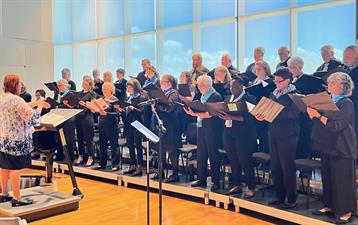 |
March 23 | 2:00 pm - 4:00 pm Community Choir Rehearsals ScheduledSt. Mark's Lutheran Church, 2nd Street, Oakland, MD.Community Choir Rehearsals Scheduled.Love to sing? Consider joining the Garrett Choral Society! Spring rehearsal season is underway on Sundays from 2-4pm at St. Mark's Lutheran Church in Oakland. This is our 46th year of presenting vocal music to the community. Feel free to stop by or email garrettchoralsociety@gmail.com for more information. The concert date is May 18 at 3pm in the Performing Arts Center at Garrett College.$20 membership fee. |
 |
March 23 | 4:00 pm California Wine Dinner at Cornucopia146 Casselman Rd, Grantsville, MD.Experience five courses of wines from Gundlach Bunschu led by winemaker Joe Uhr alongside elevated pairings from Chef Martin Galloway, CEC. One of California's oldest wineries, Gundlach Bunschu wines are produced at the prolific intersection of the Sonoma Valley, Carneros, and Napa Valley appellations, and are Regenerative Organic Certified. $125pp plus tax or gratuity, reservations essential with 50% deposit.Visit thecornucopiacafe.com for complete menu details. |
 |
March 24 | 5:00 pm - 6:30 pm "Shamrock Session" Irish Dancing Workshop at Cosmic StudiosCosmic Studios, 221 South Third St., Oakland, MD.Join us for a "Shamrock Session" and learn traditional Irish dancing with Cierra Derato (O'Keefe), a World Championship level Irish dancer, who has competed nationally and internationally over the past twenty plus years. Cierra has performed with renowned names such as Eileen Ivers, O'Malley's March, the Saw Doctors, Lilt, and many more. She's danced at the Kennedy Center, the F. Scott Fitzgerald Theater, and at various Embassy events across Washington, D.C. She brings her love of Irish dance to retirement homes, children's centers, and various other organizations across the DMV. Born into a strong Irish heritage, Cierra loves spreading her passion for Irish dance, culture, and music with audiences around the world. Join us at Cosmic Studios, Monday, March 24th from 5:00 - 6:30 pm for a beginner "Shamrock Session" workshop which will include traditional Irish dance lessons and traditional ceili practice, with drinks and snacks provided for $25! Recommended for ages 12 years and up. |
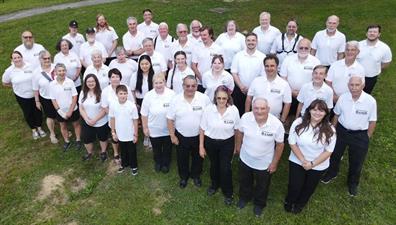 |
March 25 | 7:00 pm - 8:30 pm Community Band Rehearsals Open to New MembersPerforming Arts Center at Garrett College, McHenry, MD.It’s Spring rehearsal season for the Garrett Community Concert Band! Weekly rehearsals are in progress for the upcoming concert on Sunday afternoon, April 27. New players, both young and old, are welcome to join the band. Auditions are not required, but experience playing a band instrument is recommended. Practices are held from 7-8:30 pm on Tuesday evenings in the Recital Hall at Garrett College’s Performing Arts Center. Come give us a try! Email garrettconcertband@gmail.com for more information. |
County Commissioners Announce Public Meeting Agenda
Garrett County Government
Board of County Commissioners
Meeting will also be Live Streamed at https://www.facebook.com/garrettcountygovernment/
The Board of County Commissioners may close a portion of this public meeting and move into Executive Session to comply with a specific constitutional, statutory, or judicial requirement that may prevent public disclosure about a particular proceeding or matter.
*To comment on agenda items – please send to @garrettcountymd.gov3:00 Administrative Session
Board Appointments – Garrett County Local Emergency Planning Committee
Backbone Housing, Inc. – Request for Fiscal Year 2026 County Property Tax Abatement
Mr. Null will review a number of administrative and managerial matters under his authority and jurisdiction with the Board of County Commissioners
4:00 Call to Order of Public Session, Invocation, and Pledge of Allegiance
County Administrator – Additions/Deletions to Public Meeting Agenda
Approval of Public, Administrative, and Executive Meeting Minutes 4:05 Recognition: Callis Auto Detailing – 35th Anniversary
4:10 Garrett County Department of Financial Services – Purchasing Division
Bid Awards: Bid #25–0206 Pump Station 1–1 / 2–1
Bid #25–0306 Galvanized Steel Modular Panel Truss4:15 PUBLIC HEARING: Garrett County Department of Community Development & Planning - Garrett County Water & Sewer Master Plan 2014 – Amendment #5 – To Incorporate Critical Infrastructure Improvements
4:25 Public Commentary
ADJOURNMENT OF PUBLIC SESSION4:30 FISCAL YEAR 2026 BUDGET PRESENTATIONS:
Garrett County Community Action Committee, Inc.
Garrett County Chamber of Commerce
Ruth Enlow Library of Garrett County
Public issues or concerns that are to be presented to the Board of Garrett County Commissioners during any Public Meeting should be scheduled with Carol A. Riley–Alexander, Executive Assistant to the Board of County Commissioners/County Administrator. The Board of Garrett County Commissioners’ next scheduled Public Meeting will be on Monday, April 7, 2025 at the Garrett County Courthouse beginning at 4:00 PM.
Deep Creek Lake’s Centennial Celebration
Deep Creek Lake will have its 100th birthday in 2025, and we’ll be celebrating all year long with events and projects throughout the year. Visit dcl100.com for all the latest updates.
Lecture Series Underway
Every Thursday in March, the DCL100 Committee is presenting a lecture at the Performing Arts Center at Garrett College on a different aspect of the lake. We’ve had two great lectures so far and have two more coming up. For our first lecture, Chance Friend – Naturalist with the MD Department of Natural Resources – gave a fantastic presentation on Wildlife and Habitats of Deep Creek Lake. We messed up on recording it (forgot to turn on the mic) BUT, Chance is such a great professional that he’s agreed to record himself doing the presentation. We’ll get that posted when he does!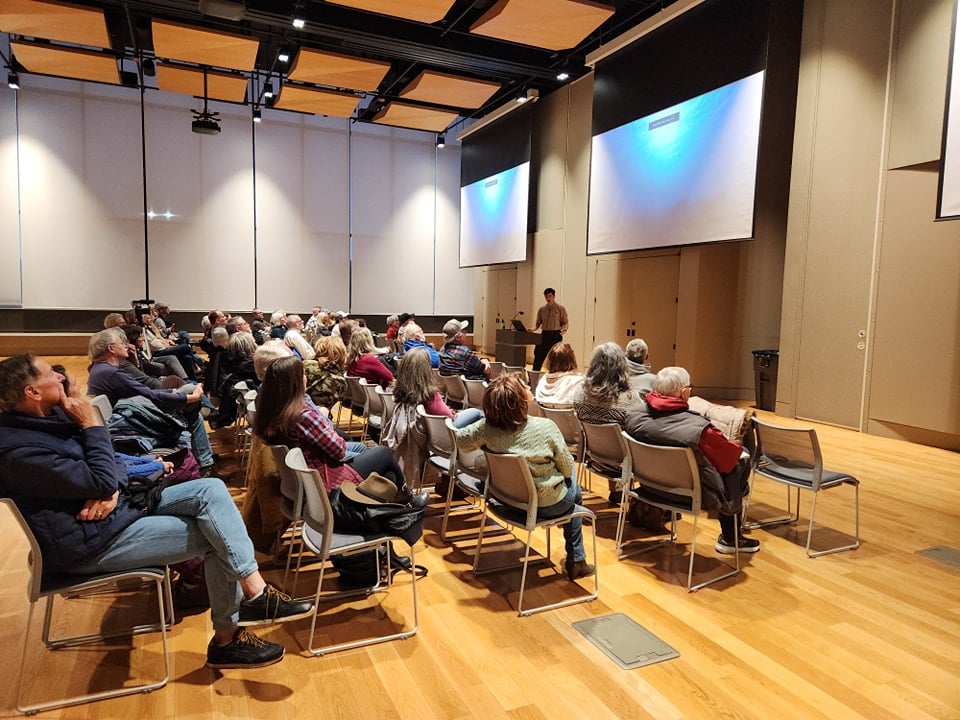
The second speaker, Eric Null – former manager of the Deep Creek Lake Natural Resources Management Area and current Executive Director of Trout Unlimited in Pennsylvania – gave a Master Class on fishing in Deep Creek Lake. If you’re looking to catch some fish in Deep Creek Lake, you need to watch his lecture!
https://youtu.be/TjFFtPKrPug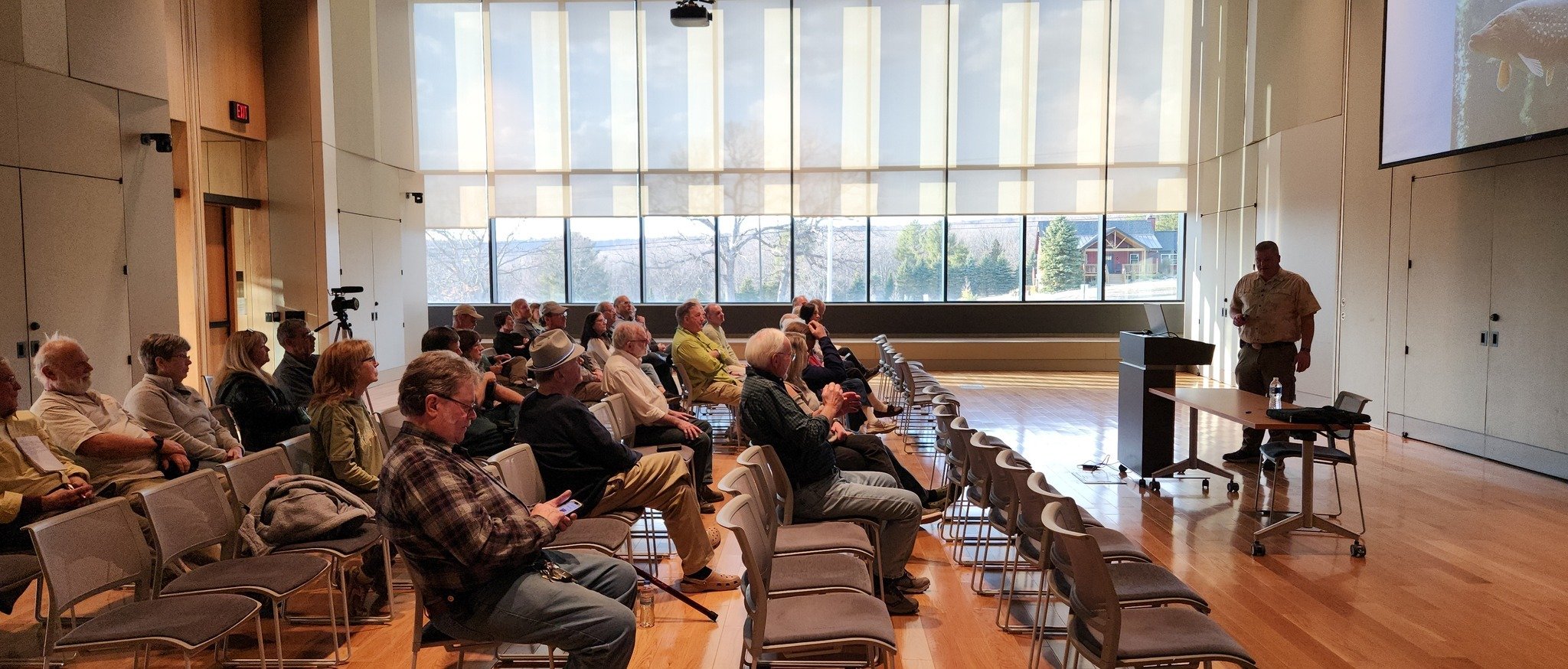
Coming up on March 20th, the operations manager from Brookfield Renewable US will talk about the operation of the dam. If you’ve ever wondered how the power plant makes electricity and where it goes, check out this presentation!And on March 27, Karen Myers will talk about the history of real estate at Deep Creek Lake. She will share her decades of experience to tell us about how some of the well-known property development came to be.The Lecture Series will occur each Thursday in March 2025 at 6pm at the Performing Arts Center at Garrett College. Attendees at the lectures will be able to collect a DCL100 Exploration Ticket and receive the punch for the month of March, and they will be able to enter to win a DCL100 swag pack. The use of the Performing Arts Center and AV support have been generously contributed by Garrett College.
Practice your Swing DanceAre you looking to get ready for the DCL100 Gala? Brush up on your dance moves this month! The Garrett Jazz Ensembles returns for another Swing Dance! Entrance is by donation and will benefit Cindy’s Fund. Refreshments will be available for purchase. Come and dance the night away with Garrett County’s local swing band! Saturday March 29, 6-9pm at the Performing Arts Center at Garrett CollegeTrivia Nights
Local “EMCEE Extraordinaire” Connor Norman will be heading up our DCL Team Trivia Nights every Thursday in April at Ace’s Run starting at 6pm. Each game will have 20 questions and will last about 2 hours. There will be preview questions and answers posted on ours and Connor’s social media the week before the events, so stay tuned to get the heads up!
Entry is free and we’ll provide the trivia trackers, answer sheets, pens etc. Delicious food and drink will be available for purchase at Ace’s. And of course, there will be awesome prizes!
More event news
Earth Day Cleanup – Saturday April 26th – we’ll be partnering with Red Beard Scuba and Recovery for a lake cleanup in celebration of Earth Day. Stay tuned for details!DCL100 Golf Tournament – July 8th at Thousand Acres Golf Course – swing your clubs at the amazing new course at Thousand Acres Golf Club – more details coming soon!Deep Creek Lake 100th Birthday Bash – July 19th at the Fairgrounds-Planning is coming along for the big event of the year – contact our Event Chair Missy Gralish if you would like to volunteer or become involved!Our vendor application is now available! Limited-edition serigraphThe Maryland Park Service has commissioned a limited-edition serigraph print by renowned artist Erick Sahler. This stunning artwork captures the beauty of Deep Creek Lake, featuring a tranquil shoreline at Deep Creek Lake State Park, a fisherman’s boat, and the iconic Glendale Bridge rising in the background.Sahler, an Illustrator Member of the prestigious Society of Illustrators, is known for his vibrant and masterfully crafted serigraphs that reflect the spirit of the mid-Atlantic region. This commemorative piece will soon be available for purchase at the Deep Creek Lake Discovery Center, offering a timeless keepsake for those who cherish the lake. Stay tuned for details on its release or contact the Discovery Center at 301-387-7067.
Full event listing And here’s the full list of events we’ve got on deck – be sure to check the website and our social media for updates!
March 6,13, 20 & 27, 2025—Lecture series about various aspects of Deep Creek Lake @ the Performing Arts Center at Garrett College – each Thursday at 6pm in March (environmental, recreational, proactively working to ensure the health of Deep Creek Lake for the next 100 years and beyond. Facebook event pageApril 3,10,17 & 24, 2025– Deep Creek Lake Team Trivia nights at Ace’s Run – test your DCL knowledge – prizes for winning teams. Facebook event pageApril 27, 2025 – Picture Party at Ace’s Restaurant (hosted by Brenda McDonnell) Facebook event pageApril 29, 2025 – Amazing Grazing – the Taste of Garrett County – DCL100 partnering with Stage WEST at GC Ag HallMay 12, 2025 – FREE Admission to Deep Creek Lake State Park (sponsored by the Western Garrett County State Park Volunteers)May 24, 2025—Deep Creek Lake Adventure Challenge – Based at Wisp Resort, teams will travel around the lake and compete in puzzles, trivia and physical challenges with prizes for teams with the most points! Facebook event pageJune 21, 2025 – FREE Admission to Deep Creek Lake State Park (sponsored by the Western Garrett County State Park Volunteers)June 21, 2025 – Recreation Fair at Deep Creek Lake State Park (sponsored by the Garrett County Health Department’s Population Health, Innovation, and Informatics Unit)June 21, 2025 – Boat parade on Deep Creek Lake – Put on by the Deep Creek Lake Lions Club, the parade will feature entries from all towns, various businesses, individuals and organizations. Facebook event pageJune 27, 2025 –DCL100 parade float in Grantsville Days ParadeJuly 4, 2025 – DCL100 parade float in Accident Homecoming ParadeJuly 5, 2025 – DCL100 Sailboat Regatta on Deep Creek Lake held by the Deep Creek Yacht Racing AssociationJuly 8, 2025 – DCL100 Golf Tournament at Thousand AcresJuly 12 – 13, 2025 – Victorian Chautauqua in Mt Lake Park featuring one or more speaker portrayers with DCL connectionsJuly 19, 2025 – DCL100 Birthday Bash – FREE or low charge entrance to a festival at the Garrett County Fairgrounds—to feature bands & music, a Kidzone, parade, craft & arts displays and sales, food vendors, contests and a special ending surprise (12 noon – 10 pm) Facebook event pageJuly 21, 2025 – FREE Admission to Deep Creek Lake State Park (sponsored by the Western Garrett County State Park Volunteers)July 26, 2025 – DCL100 parade float in Kitzmiller Homecoming ParadeAugust 14, 2025 – FREE Admission to Deep Creek Lake State Park (sponsored by the Western Garrett County State Park Volunteers)August 16, 2025 – DCL 100 parade float in Friendsville Days ParadeAugust 23, 2025 – Deep Creek Lake Centennial Gala – at Wisp Resort – Roaring 20’s theme with Big Band live music—capacity –400 people Facebook event pageSept 6, 2025 – Deep Creek Lake Art and Wine Festival – held by HART for AnimalsSept 7,2025 – Watersports Exhibition on Deep Creek LakeSeptember – end of October – Cove Run Corn Maze will feature a DCL100 themeFor more information on the events during the Centennial, visit dcl100.com or contact deepcreeklakepoa@gmail.com to learn more about sponsoring the celebration, volunteering or sharing photographs, memories or memorabilia.
Our Sponsors
Much thanks to the sponsors of the DCL100!The DCL100 CommitteeThe Deep Creek Lake Centennial Committee, was established in 2023 by the Property Owners’ Association of Deep Creek Lake to celebrate the centennial of the lake in 2025. The DCL100 Committee, comprised of representatives from over 10 organizations, has the mission to celebrate the history of the lake and to promote its protection for the next 100 years and beyond
Follow us!Property Owners’ Association of Deep Creek Lake, IncPO Box 816, McHenry
Wolf Den Run State Park Trail Added to Jeep ‘Badge of Honor’ Program
Maryland Department Of Natural Resources
An off-highway vehicle trail at Wolf Den Run State Park is now part of the Jeep Badge of Honor trail program. The Jeep brand announced the designation on Feb. 28, along with designations for trails in Minnesota and Washington. There are 61 Badge of Honor trails nationwide.
When a driver takes on the adventure of completing a trail, they are rewarded with a badge through the program, which they can proudly display on their vehicle. For adventure-seekers, these badges mark achievements they can trace throughout the U.S.
“Owner feedback is essential at the Jeep brand, and Trail 2103 was one of the most highly requested. We’re excited to finally bring it to life. With no previous trails in Maryland, this addition helps us achieve our goal of ‘spreading the love’ by filling in geographical gaps and offering new adventures to our Jeep community in every corner of the country,” said Joe Brungardt, manager, Jeep Badge of Honor program.
Located in the Potomac River Area of the park, Trail 2103 follows the north branch of the Potomac River through the rocky forest. Maryland Off-Highway Vehicle Alliance Board Member Ken Kyler nominated Trail 2103 through Jeep’s Badge of Honor phone app, and thinks the trail was selected because it has amazing views of the Potomac River. There are more challenging trails at Wolf Den Run, but none with such scenery.
“Particularly in the springtime when the rhododendrons and dogwoods are out, it’s just a flat-out gorgeous trail,” Kyler said.
Kyler encouraged other off-road enthusiasts to nominate the trail, including those from the Capitol Off-Road Enthusiasts (CORE 4×4).
CORE 4×4 President Jendra Rambharos said his organization has hosted events at Wolf Den Run since the park’s opening in 2019. These trips include camping, eating at local restaurants and using local repair shops.
“The proximity to Deep Creek, and the amenities there are also a draw for us, as we’ve visited, stayed at, and even fished in the area, adding to both public and private resources through amenities and licensing,” Rambharos said.
DNR worked with Jeep to get the information submitted for the recognition.
“We want to thank the community for nominating our trail for this prestigious program – it shows off-highway recreation is gaining traction here in Maryland and provides another way to get people connected to the land as well as provides an important economic impact to the nearby community,” Maryland Office of Outdoor Recreation Director Sandi Olek said.
Park Manager Donald Oates said there are unique rock outcroppings along the trail. The area has rugged and mountainous terrain, with meadows, wetlands, small tributaries and many ephemeral streams throughout. Drivers may encounter the occasional water feature depending on the time of year.
Trail 2103 isn’t the only fun OHV trail at Wolf Den – there are more than 50 miles of trails to check out. Campsites are also available.
“We have miles and miles of trails that are good for Jeeps,” Oates said.
Most off-road trails at Wolf Den Run are former mining or logging roads, with plenty of space for larger vehicles like Jeeps. Trail 2103 can be made into a loop using trails 2104 and 2101. A map of Trail 2103 and adjoining trails can be found on the Wolf Den Run State Park website.
There are no air compressors available at the park, so drivers need to plan accordingly and be prepared.
Wolf Den Run State Park opened in 2019, the first park in the state to offer trails for off-road vehicles. Maryland Park Service expanded Wolf Den Run in 2020.
Before the park opened, Off-Highway Vehicle Alliance Board volunteers spent a day clearing appliances and other large debris from the site. The Alliance and DNR work together to promote environmental stewardship when riding. ATV
Riders can recreate responsibly by staying on designated trails, respecting wildlife, and being considerate of other trail users. In addition, riders can practice good stewardship by avoiding muddy areas, crossing streams at a 90-degree angle, using four-wheel low and first gear for engine braking, and going over obstacles like rocks rather than around them to prevent trail widening and erosion.
Price Improvement! 607 K St Mt Lake Park
![]() Price Reduced!
Price Reduced! ![]()
Don’t miss your chance to own this property at 607 K Street, Oakland, MD 21550! Now available at a new, lower price—this is the perfect opportunity to make it yours. https://bit.ly/3DOjBQB
![]() Spacious layout
Spacious layout
![]() Prime location
Prime location
![]() 8 town lots
8 town lots
Schedule your showing today! 301-501-0420 ![]() #PriceReduction#OaklandMD#DreamHome
#PriceReduction#OaklandMD#DreamHome










